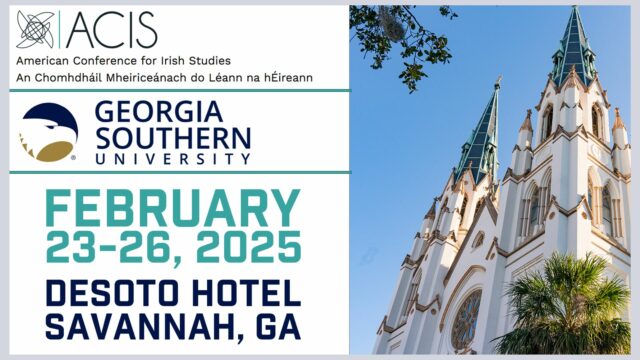
Call for Papers
The Program Committee of the 2025 international conference of the American Conference for Irish Studies (ACIS) cordially invites the electronic submission of proposals for papers, panels, and other relevant presentations. Hosted in the DeSoto Hotel on Liberty Street in the Historic District of Savannah, Georgia, USA, the conference opens on Sunday, February 23, and closes on Wednesday, February 26, 2025. Submissions should engage with (or be adjacent to) the conference’s theme, “Tradition + Innovation” / “Traidisiún + Nuálaíocht.” Fáiltíonn an chomhdháil roimh aighneachtaí i nGaeilge.
Many disciplinary and interdisciplinary approaches are possible when addressing the fact that Ireland and its diaspora have navigated — and continue to navigate — a range of traditional identities and practices while also generating and advancing innovation.
Even as it highlights, as an Irish characteristic, the lively embrace of certain cultural, attitudinal, and behavioral traditions (from GAA to what, in James Joyce’s “The Dead,” Gabriel Conroy calls “genuine warm-hearted courteous Irish hospitality”), much present-day marketing of “Brand Ireland” highlights innovation, associating it especially with a young and diverse population, highly educated and highly adaptable.
The November 2023 Dublin anti-immigration riot notwithstanding, the dominant innovation narrative insists that Ireland values having “international and multicultural talent” in its labor force, as evidenced by the fact that 470,000 non-Irish citizens work in the country.3 In addition, social innovation is acknowledged through reference to such matters as the popular 2015 vote to legalize same-sex marriage and the 2023 establishment of St. Bridget’s Day as a public holiday. Clearly, the latter outcome constitutes a striking example of the rhyming of innovation and tradition.
Ireland’s centuries of history as a colonized country have informed its tradition-innovation calculus. Being able to promote itself as the European Union’s sole English-speaking (and common law) member nation has helped Ireland attract biopharmaceutical, information technology, and other cutting-edge companies. However, the English language as a significant innovation asset emerged from a radical decline in the use of Gaeilge, the Irish language, a key component of Irish tradition. Central to the falling-oc was a colonial innovation: the National School initiative, articulated in the Stanley Letter of 1831.
The revival, between the 1880s and 1920s, of cultural traditions in such domains as language, sports, theater, and design proved important in creating the self-governing entity known (since 1949) as Ireland/Republic of Ireland. Notably, though, the revival’s partial recovery of indigenous heritage — and such related interventions as Éamon de Valera’s 1943 “The Ireland … we dreamed of” radio address — did not preclude the state’s embrace of innovation. One thinks of the Desmond Fitzgerald-designed Dublin Airport terminal building (1938-1941) and the Ardnacrusha hydroelectric scheme (1925-1929), the latter a precursor of sorts to today’s ambitious Ocshore Renewable Energy Development Plan, an aspect of whose development is the INFOMAR program, which will render Ireland the first country to complete a systematic mapping of its marine territory.
In 2022, in his capacity as Ireland’s Minster for Enterprise, Trade, and Employment, Tánaiste Leo Varadkar, wrote, “The future health of our national economy rests on our ability to innovate to respond to change. Innovation and pioneering R&D will help us to take the radical actions required to build a sustainable planet and move towards a digital society. … [W]e must make sure we realize the potential for innovation-led growth in every part of the country.”4
How tradition can and should inform the foregoing is but one of many questions relevant to the tradition-innovation
dynamic in Ireland. Others include, but are not limited to, the following:
- When seen as authoritative, has tradition stymied innovation?
- When seen as threadbare, has tradition spurred innovation?
- Has innovation become tradition?
- Has the economic stress of maintaining tradition necessitated innovation?
- Has fear of tradition precipitated innovation?
- Has innovation depended on tradition?
- Has innovation compromised or canceled tradition?
- Has innovation caused certain traditions to revisit their mutual relationship?
- Has being Irish abroad, in innovation-heavy economies, induced nostalgia for tradition?
- Have certain tradition-disrupting innovations, introduced in past centuries, become essential features of the Irish scene?
- Has the promotion of Irish culture as tradition-rich eclipsed a narrative about the country as innovative?
- For other British Empire countries, what consequences resulted from Irish innovation in response to traditional colonial power structures?
1 https://www.ida-ireland.es/latest-news/insights/ireland-s-extraordinary-talent#title5
2 Government of Ireland’s National Smart Specialization Strategy for Innovation 2022-2027, page 4.
https://enterprise.gov.ie/en/publications/publication-files/national-smart-specialisation-strategy-for-innovation-2022-2027.pdf
Submission Guidelines
- Submissions are considered and accepted on a rolling basis from now through the final submission deadline of 11:59 PM (US Eastern time) on December 30, 2024. The latest notice of acceptance is 11:59 PM (US Eastern time) on January 15, 2025.
- To present at the conference, one must be a member of the American Conference for Irish Studies. To join the organization or renew an expired/expiring membership, please visit https://acisweb.wildapricot.org/join.
- Presentations must be delivered in person at the conference venue. Online presenting is not an available option.
- Whether the context be a regular session or a panel session, delivery of one’s paper should not exceed 15 minutes. A two-minute grace period is allowed, but session chairs have the right to firmly halt a presentation that gets to 17 minutes in length.
- Regardless of the type of session, a paper may be presented in English or Irish. Please note that the conference does not provide translation services between the two languages. Should a presenter wish, they may distribute tosession attendees printed copies of their paper in the language not being used for live delivery.
- A presenter can assume that each session location will have the capacity to show Powerpoint slides. However, the conference committee cannot guarantee the availability of video and/or audio projection.
- See the conference form for submission requirements for general session papers and panel submissions.